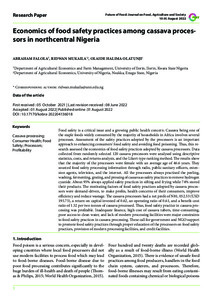| dcterms.abstract | Food safety is a critical issue and a growing public health concern. Cassava being one of the staple foods widely consumed by the majority of households in Africa involves several processes. Assessment of the safety practices adopted by the processors is important to assist marketers and consumers towards the product to avoid food poisoning. Thus, this research assessed the economics of food safety practices adopted by cassava processors. Data collected from randomly selected 120 cassava processors were analysed using descriptive statistics, costs and returns analysis, and the Likert-type ranking method. The results show that the majority of the processors were female with an average age of 46.6 years. They sourced food safety processing information through radio, public sanitary officers, extension agents, television and the internet. All the processors always practised the peeling, washing, fermenting, grating and pressing of cassava as safety practises to remove hydrogen cyanide. About 95% always applied the safety practices in sifting and frying while 74% stored their products. The motivating factors of food safety practices adoption by cassava processors were demand-driven, to make profits, health concern of their consumers, to improve efficiency and to reduced wastage. The cassava processors had a net profit of N81,052.33 (USD 195.75), return on capital invested of 0.62, an operating ratio of 0.61 and a benefit-cost ratio of 1.52 per two tonnes of cassava processed. Thus, food safety practice in cassava processing was profitable. Inadequate finance, high cost of cassava tubers, time-consuming, poor access to clean water and lack of modern processing facilities were major constraints to food safety practices in cassava processing. These call for government and NGOs supports to promote food safety practices through proper education of the processors on food safety practices, provision of modern processing facilities and credit facilities. | eng |


